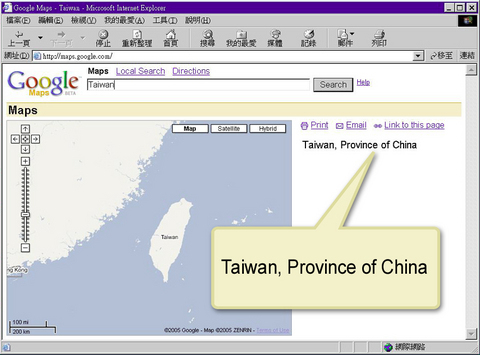The Taiwan Solidarity Union (TSU) legislative caucus yesterday called on the public to write to Google to protest its listing of Taiwan as a "province of China" on its Google Maps service.
In addition to sending its own letter of protest to the US search-engine giant, the caucus asked the government to lodge a formal protest and request Google to clearly define Taiwan as "an independent state."
TSU caucus whip David Huang (黃適卓) said that Google Maps' definition of Taiwan as part of China was not only far-fetched but also unacceptable to the nation's people.

GRAPHIC: TT
"Taiwan is an independent, sovereign state. Taiwan is not part of China," Huang said.
"Taiwan has never been ruled by China, nor has the Chinese government deployed any government functionaries or armed forces here," he said.
According to Google's Web site, Google Maps provides users with data such as business locations, contact information and driving directions.
By listing Taiwan as a province of China, Google Maps is clearly succumbing to pressure from China to distort the international community's perception of the cross-strait situation, Huang said.
"It seriously sabotages the nation's sovereignty. The people of Taiwan should not allow China to spread such misleading information to the international community," Huang said.
TSU Legislator Tseng Tsan-teng (曾燦燈) said that the search engine's listing of Taiwan as a part of China has no basis in reality whatsoever.
"The public should condemn Google for belittling the nation's sovereignty. We simply cannot remain idle, because the nation's sovereignty is bound to be eroded inch by inch if we fail to take heed of China's petty political maneuverings in cases like this," Tseng said.
TSU Legislator Huang Chung-yung (
Ministry of Foreign Affairs Spokesman Michael Lu (
"Taiwan is not a province of China," Lu said.
David Wang (王建業), deputy director-general of the ministry's Department of Information and Cultural Affairs, said this was not the first time international Web sites or media outlets have included Taiwan as part of China's territory.
"Our stance on the matter is clear: It is something for which we have zero tolerance, and there should also be zero ambiguity about the nation's sovereignty," he said.
"Swift action must be taken to take care of the matter and set the facts straight," Wang said.
Tony Ong (
"I encourage the public to inform government agencies of similar occurrences," he said.
Those interested in lodging an online complaint with Google can go to http://www.google.com/support/maps/bin/request.py.
Additional reporting by Shih Hsiu-chuan
also see story:

Taiwan is gearing up to celebrate the New Year at events across the country, headlined by the annual countdown and Taipei 101 fireworks display at midnight. Many of the events are to be livesteamed online. See below for lineups and links: Taipei Taipei’s New Year’s Party 2026 is to begin at 7pm and run until 1am, with the theme “Sailing to the Future.” South Korean girl group KARA is headlining the concert at Taipei City Hall Plaza, with additional performances by Amber An (安心亞), Nick Chou (周湯豪), hip-hop trio Nine One One (玖壹壹), Bii (畢書盡), girl group Genblue (幻藍小熊) and more. The festivities are to

Auckland rang in 2026 with a downtown fireworks display launched from New Zealand’s tallest structure, Sky Tower, making it the first major city to greet the new year at a celebration dampened by rain, while crowds in Taipei braved the elements to watch Taipei 101’s display. South Pacific countries are the first to bid farewell to 2025. Clocks struck midnight in Auckland, with a population of 1.7 million, 18 hours before the famous ball was to drop in New York’s Times Square. The five-minute display involved 3,500 fireworks launched from the 240m Sky Tower. Smaller community events were canceled across New Zealand’s

‘IRRESPONSIBLE’: Beijing’s constant disruption of the ‘status quo’ in the Taiwan Strait has damaged peace, stability and security in the Indo-Pacific region, MOFA said The Presidential Office yesterday condemned China’s launch of another military drill around Taiwan, saying such actions are a “unilateral provocation” that destabilizes regional peace and stability. China should immediately stop the irresponsible and provocative actions, Presidential Office spokeswoman Karen Kuo (郭雅慧) said, after the Chinese People’s Liberation Army (PLA) yesterday announced the start of a new round of joint exercises around Taiwan by the army, navy and air force, which it said were approaching “from different directions.” Code-named “Justice Mission 2025,” the exercises would be conducted in the Taiwan Strait and in areas north, southwest, southeast and east of Taiwan

UNDER WAY: The contract for advanced sensor systems would be fulfilled in Florida, and is expected to be completed by June 2031, the Pentagon said Lockheed Martin has been given a contract involving foreign military sales to Taiwan to meet what Washington calls “an urgent operational need” of Taiwan’s air force, the Pentagon said on Wednesday. The contract has a ceiling value of US$328.5 million, with US$157.3 million in foreign military sales funds obligated at the time of award, the Pentagon said in a statement. “This contract provides for the procurement and delivery of 55 Infrared Search and Track Legion Enhanced Sensor Pods, processors, pod containers and processor containers required to meet the urgent operational need of the Taiwan air force,” it said. The contract’s work would be